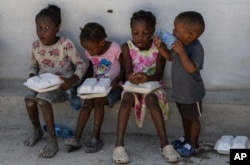Haiti’s interim prime minister, Garry Conille, visited Washington, D.C., last week to meet with U.S. officials amid international efforts to restore order to the violence-wracked country.
Warring criminal gangs have destabilized Haiti, displacing 580,000 people — 300,000 of them children — since March and killing an estimated 5,000 people each year, according to United Nations estimates.
Russia’s Permanent Representative to the U.N., Vasily Nebenzya claimed the U.S. is using the illicit flow of arms to Haiti to exert control over the country.
“Washington could have tackled the problem long ago, if it really wanted to. Instead, it seem that our United States colleagues prefer to use illegal arms shipments, on which US arms dealers make money, as leverage to influence the situation.”
That is unsubstantiated.
U.S. lawmakers recognize the role illicit arms play in destabilizing Haiti, and the national security threat that poses to the U.S., spurring wide-ranging efforts to address the issue.
The Congressional Research Service said Haitian authorities lack control over its ports and borders, making the country “a hub for drugs and arms trafficking.”
Still, U.N. experts said arms smugglers in the U.S. are the predominant suppliers of the “deadly arsenals” in Haiti.
Smugglers buy guns in states with less restrictive gun laws, like Florida, and then traffic them to Haiti.
The U.N. Office on Drugs and Crime identified four trafficking routes to Haiti, including two via cargo ship from Florida.
The U.N. said that control agencies had doubled the number of searches in 2023, noting U.S. authorities made most of their illicit arms seizures in Miami.
“We continue to work to limit outflow of smuggled firearms and ammunition to Haiti, identify and prosecute firearms traffickers, and support the Haitian National Police in countering the recipients of the majority of illicit firearms: the gangs,” a State Department Spokesperson told Polygraph.info.
In June 2023, the U.S. announced it had created the position of Coordinator for Caribbean Firearms Prosecutions to disrupt illegal firearms trafficking, and to implement provisions of the U.S. Bipartisan Safer Communities Act (BSCA).
BSCA “dramatically increased” criminal penalties for individuals involved in “U.S.-sourced firearms trafficking.”
In March, U.S. lawmakers introduced the Arms Trafficking Causes Harm (CATCH) Act, which require the Coordinator for Caribbean Firearms Prosecutions to report on the implementation of anti-firearm-trafficking provisions in the BSCA.
In November 2023, the U.S. announced it would help Haitian authorities track arms used in crimes, and identify traffickers.
In February, U.S. Homeland Security Investigations and Haitian officials established the Haiti Transnational Criminal Investigative Unit (TCIU).
“This unit will facilitate the exchange of information between law enforcement in each country and enhance cross-border investigative capabilities to prosecute transnational criminals,” the State Department spokesperson said.
In February, Secretary of State Antony Blinken said that from July 2021, the U.S. had allocated $189 million to help vet, train, professionalize and equip Haitian National Police.
In June, the White House said it would provide Haiti another $95 million for security mission support and $15 million to assist Haitian National Police.
The U.S. has imposed sanctioned and introduced visa restrictions on over 50 Haitian individuals for supporting criminal gangs, undermining Haiti’s democratic processes, and other offenses.
The U.S. also supported the renewal of an arms embargo on Haiti, and seeks to impose international sanctions on individuals undermining Haiti’s security.
The U.S. and Ecuador co-wrote a resolution to establish the Multinational Security Support (MSS) mission to Haiti.
In October 2023, The U.N. Security Council approved the MSS, which entails a deployment of a multinational force to Haiti to help authorities restore law and order.
By June, the U.S. had pledged $380 million to support the MSS.



